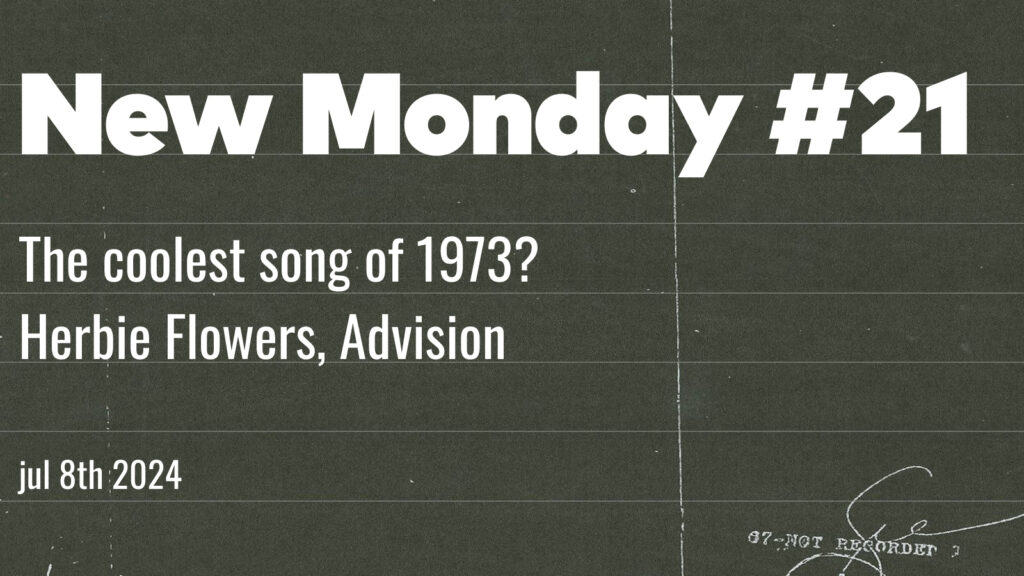New Monday #21
Happy Monday!
I wish I could go back to ten-year-old me listening to the radio when I heard this for the first time. The damn DJ didn’t say the singer’s name, and I misheard the title as “Rocco,” or “Rock Oh."
Of course, the title is "Rock On,” David Essex’s biggest hit, and 51 years later, it's still amazing.
Essex was more successful as an actor than a musician, but he had 19 top 40 singles in England during his career, as well as successful albums. Rock On cracked the Billboard Top 40.
Slapback on the Vox
Rock On started with a demo, which consisted of Essex singing and playing drums on a garbage can as a drum. The engineer on the session put a loud slapback echo on the demo, and that is really the crux of the sound of it, and what makes it so frickin’ distinctive.
But the lead vocal isn’t echoed the entire time. It sometimes splits and hockets from the left channel to the right, sometimes it’s doubled, sometimes there’s a harmony. There’s a wonderful moment where a mass of vocals drop in like Māori warriors performing a Haka. Supercreative use of vocal texture, and keeping the ear’s interest while never losing the thread of the song.
Chordless Arrangement
The vocals have so much breathing room because of the minimalist arrangement of producer Jeff Wayne. Wayne heard the demo and figured out a score for drums and percussion, bass, and a few string players. The music bed is melody lines rather than chords. In fact, the only true chord is the massed vocal.
The classically trained London string players hired for the session were playing too tight and in tune for Wayne and Essex’s taste. They solved the problem by getting them all a little drunk.
Enter Herbie Flowers
Wayne’s arrangement had a rudimentary bass part. Fortunately for the session, the guy they hired was Herbie Flowers.
Herbie Flowers was a top session man in England. He occasionally toured, but touring got in the way of his very busy studio career. By the end of the '70s he stopped counting the number of records he’d tracked on (over 500 at the time). Flowers played double bass (traditional upright string bass), electric bass and tuba, and was equally proficient playing rock, jazz, classical - whatever the session called for. He played bass for Bowie, Elton John, Miles Davis, all the Beatles except John, and tuba on Abbey Road.
Steal These Ideas
Flowers was also a businessman. At the time, session players got more money the more tracks they laid down. Herbie talked Wayne and Essex into letting him put two tracks down, one low and the other high. The result is the incredibly cool bass part on Rock On. It’s the lick that makes the record.
Flowers tuned the low bass down a half step, which resulted in a low-end mess of rumble at the end of each iteration of the riff.
Usually, putting reverb on a bass isn’t a good idea. But with the right arrangement, it can certainly work, and it does on Rock On. The riff Flowers came up with for the overdubbed high bass part, slathered with plate reverb and a hint of delay, sounds like a guitar part. There’s not a guitar to be found on Rock On.
Check This Out
I found this brilliant guy, Chris Eger, who put together what sounds like a note-for-note version of Rock On, with him playing and singing every part. It's a vision of what happened back in 1973 at Advision Studios in London. It’s a deceptively simple song.
Check out his channel. It’s so damn cool!
The Whole Album is Killer
While Rock On is the standout track, the entire Rock On album, which was Essex’s debut, is a sonic adventure. It’s 70s glam, but it’s peppered with horn arrangements that evoke Vaudeville, strange strange vocals, clever arrangements and wonderful production touches. And tons of Herbie Flowers bass lines with a fat sound that manages to be low and articulate at the same time.
There’s a semi-reggae tune called Ocean Girl... I don’t even know where to begin with this track. Is that an early use of vocoder on that vocal on the left channel? And if not, how did they do that effect? There’s something that sounds like a slide guitar flitting around the background, but I think it’s an Ondes Martenot, which is an obscure French electronic instrument, developed in the late 1920s. It sits somewhere between a cello and a theremin. It’s credited on the album. I think it’s lurking on Ocean Girl. What do you think?
Actually, this whole album is really worth a listen. Seriously. Put it on and cop a bunch of great ideas off of it.
Until next week... Rock On!
That was cheesy.
The Guys at Korneff Audio


